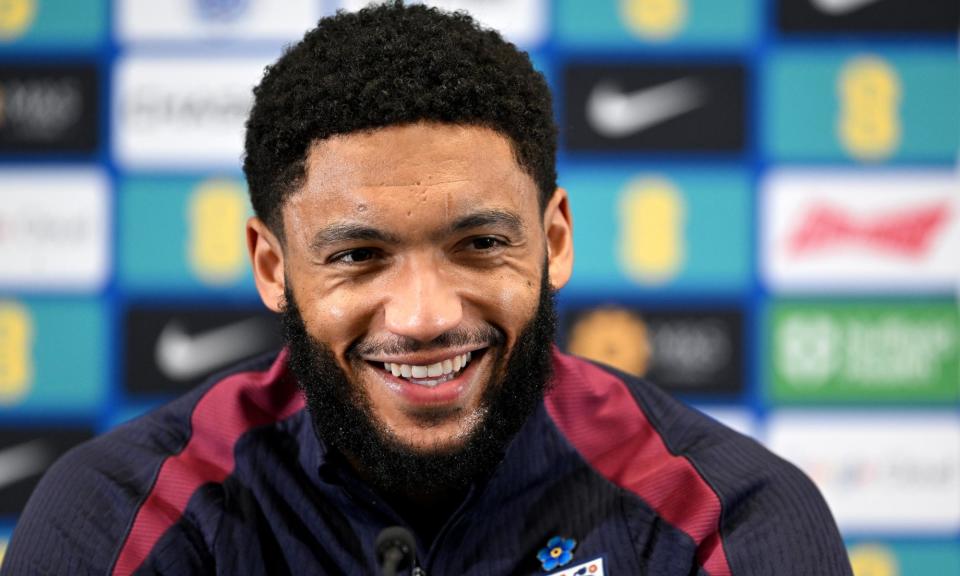Joe Gomez: ‘Psychologically it was tough … I had to trust my body again’

From the outside looking in, to borrow the words that Joe Gomez uses, nobody would have realised. When the Liverpool defender stepped on to England’s main training pitch at St George’s Park on Tuesday, it was his first involvement with the squad since November 2020. Everybody knew that and, as such, recognised it was a moment in time, something special.
What they did not realise, as a top footballer went through a fairly routine session, was what was bubbling on the inside. For Gomez, it was a return to the scene of his most traumatic episode, when an innocuous movement, the kind he had performed throughout his career without thinking, had life‑changing consequences.
Related: ‘A pretty mad couple of days’: Kobbie Mainoo eyes Euros after England call-up
Gomez is out the other side, starring for Liverpool in a variety of positions, pushing to bring the curtain down on the Jürgen Klopp era in style. His delight at his England recall for the Wembley friendlies against Brazil and Belgium is pronounced. But the words tumble out with particular force when he goes back to the fateful day, that one action, which has given him perspective; a cause, too. He has been desperate to “close the chapter,” as he puts it. Only now has he been able to do so.
“It was the same pitch,” the 26‑year-old says. “We were doing an 11 v 11 when I got the injury. It was a patella tendon rupture. I was by myself. I went to play a pass, I planted my foot and then it ruptured. It was quite gruesome. My kneecap was halfway up my leg. A lot of it is a blur because of the pain.
“It was a bit surreal [to return]. I’d prepared myself mentally but I think naturally there was a bit of an underlying trauma that I can now draw a line under, coming back. It meant a lot in that sense.
“I would be lying if I said it did not have a psychological toll as I left here in an ambulance quite abruptly from the training pitch [the last time]. Just doing the warm-up on Tuesday, it was nice. Everyone gets injured but with it being so sudden the way it happened and never getting a chance to come back … it was tough to deal with.”
Gomez did not play again for nine and a half months. The last of his 11 England caps had come against Wales in October 2020 in a behind-closed-doors friendly during the Covid pandemic. He had been involved against Iceland and Denmark the previous month, also ghost games. So the last time he played for England in front of a crowd was against Montenegro in November 2019 when his introduction as a substitute was booed by a section of the Wembley crowd.
Gomez’s crime? To have been attacked by Raheem Sterling in the St George’s Park canteen after the squad had met up, a continuation of their beef from the Liverpool v Manchester City game the previous day; Sterling was at City at the time. Gareth Southgate had given Sterling a one-match ban and the fans, weirdly, had blamed Gomez. If he could now feature against Brazil or Belgium in front of a packed house, it would be another significant marker.
“It was testing … you never want that to happen in front of your own crowd,” Gomez says. “Although it’s a scenario I have long since moved past. I am looking forward to getting back in front of the fans and playing. I didn’t delve too deep into it or let it consume me too much. I understood. It wasn’t great, obviously. I’d be lying [if I said otherwise].”
Gomez is most interesting when he reflects on his journey from the tendon injury to the form that had Klopp saying on the Sunday before last: “Joe Gomez … Gareth, honestly?” Gomez has excelled as a makeshift left-back, even in defensive midfield, as well as right‑back and his favourite position of centre-half. Southgate prizes versatility and he could do so even more at Euro 2024 in the summer when he will name a 23-man squad; it has been 26 at the previous two tournaments.
What is striking about Gomez is how he holds the hardship he has suffered close. He uses it as fuel. There was a clear note of catharsis as he spoke on Wednesday afternoon.
“The last time I saw Gareth, I was on the bed waiting for the ambulance,” he says. “It was the hardest point in my career – just that moment because of how it happened. It’s a massive part of my life and I wouldn’t shy away from it.
“A big part of my application and motivation comes from working in that period to get back and I don’t want to lose that because it has shaped me into who I am. It’s definitely changed my application in terms of everything – recovery, gym work and so on.
“Psychologically it was tough as I was by myself [when the injury happened] and I had to trust my body again. But I’m grateful for it all. I can always lean on it to keep perspective and see the positives.”
Gomez did not expect the call from Southgate. He had booked a short break to Dubai and needed to cancel it. But he does not pretend he has not spent “a fair amount of time wanting to be back with the boys and back to this level”. It was natural that Gomez fielded questions about his ambitions in terms of the European Championship. One step at a time. He has already done something seismic.

 Yahoo Sport
Yahoo Sport 





































